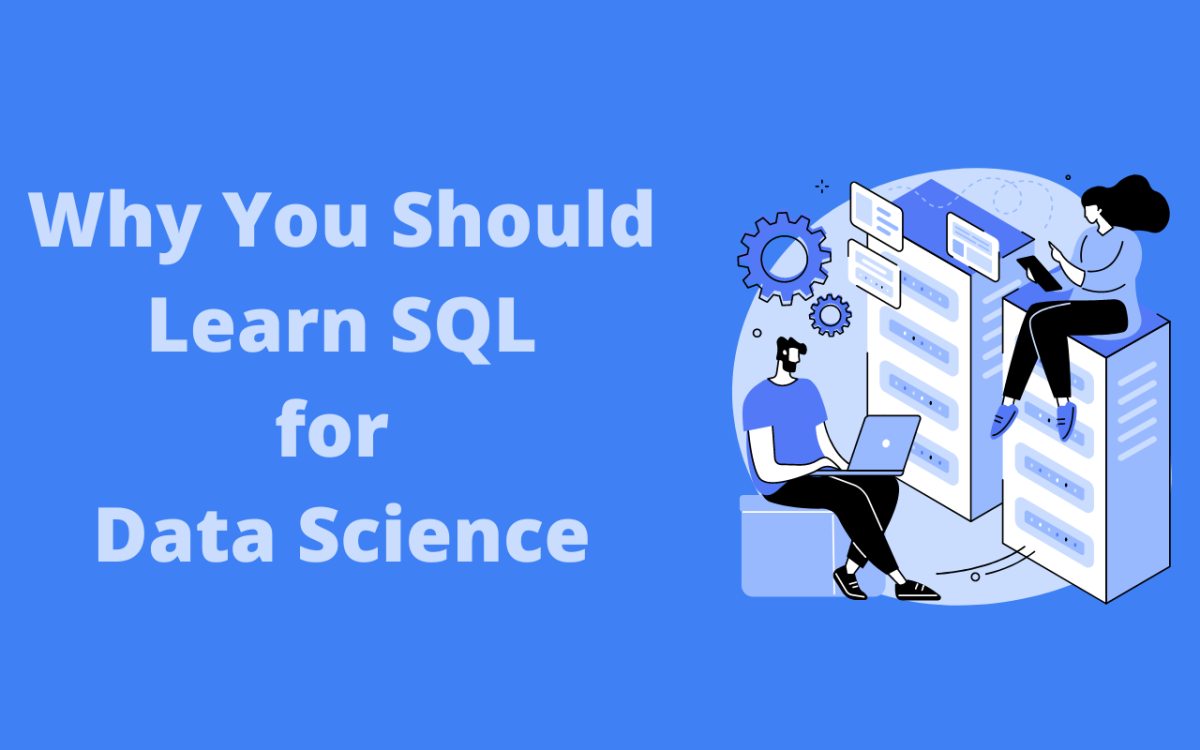Image made in Canva
What Is SQL?
It is a standard language for manipulating and accessing data. It’s used to create and read tables, manipulate them (insert, update, delete), join tables together, filter the results with WHERE clauses and ORDER BY statements, etc. SQL is a declarative language, meaning it’s more about what you want to do than how it should be done. SQL allows you to access and interact with a database directly without having to use another programming language. This means you can run complicated queries without writing code in your preferred programming language. Instead, you use the SQL syntax and get what you want from the database. It’s compelling for this reason alone, but there are other reasons that SQL is important for data scientists. It’s a handy skill and can help you with many projects. Here are five reasons why SQL is so critical in data science.
1. SQL Is Powerful
SQL is a powerful language. It can be used to manipulate data, create new tables, insert data into tables and retrieve the results of queries. The syntax of SQL is similar to Structured Query Language (SQL), making it easy for developers familiar with SQL to learn Python. SQL allows you to query the database and return results in an easily readable format so that you don’t have to go through each row manually or use other tools like Excel or R scripts directly on your database server to get the needed information. It is an effective tool that allows you to quickly get the answers you need without having to spend countless hours of your time trying out different algorithms and writing code.
2. SQL Is Familiar
It’s easy to forget how important SQL is when working with data science tools like Python, R, and Spark. But if we move back and look at the big picture, it becomes clear that SQL is an essential language for working with databases. SQL is a standard language for interacting with databases. This means that if you know how to write queries in SQL (and most people do), you can use those same skills in any database application or tool—not just ones written in Python or R. You don’t even need an advanced knowledge of statistics. Furthermore, because SQL was explicitly designed for storing data in relational tables, it’s not surprising that many different languages use it as their default method of interacting with those tables.
3. SQL Is Sharable
It is a language that can be used to share data. Data scientists need to understand this language because it allows them to work with other people in their organization who have different skills but need access to the same information. This means that if you are working on a project with an engineering team and you need to provide them with some data, SQL is a good way of doing so because it will allow them access and flexibility.
4. SQL Is Common
SQL is a language that data scientists, analysts, and business users use to query databases. It’s the most common language for querying data warehouses and data lakes. While SQL is not the only way to access Hadoop or Spark, it’s also very often used for this purpose. All primary tools used to analyze data (e.g., Tableau) support querying relational databases using SQL syntax. Because SQL is the language that data warehouses and business intelligence professionals use, it’s an excellent selection if you want to share data with them. SQL is also the language that data scientists use most often. If you’re working with a team of data scientists, it can be helpful to share the same query syntax. This will make it simple for your team members to understand what each other is doing and communicate about projects.
5. SQL Is Relevant
SQL is relevant because it’s used for many data science tasks. You can use SQL to explore your data and understand it better, clean up your data, prepare the data for analysis, build models on top of the cleaned and prepared data set, visualize your results and report on them. Lots of other languages are just as important in their own right, but they don’t have nearly as broad a range of uses that apply across various phases of a project. This is what makes SQL so valuable. It’s not just a tool for data scientists; software engineers and business analysts also use it.
Conclusion
In conclusion, SQL is an essential skill for data science. It allows us to understand the world around us and make better decisions. It’s also helpful in communicating with other people about our projects, whether they are other data scientists or members of a non-technical team (like marketing). There are many reasons why SQL is important for data science work, but these five stand out as being especially relevant: powerful, familiar, sharable, common, and relevant. I hope this article post has been informative and has given you enough reasons to start learning SQL today.
Free Resources to Start Learning SQL
Khan Academy | Intro to SQL: Querying and managing dataFreeCodeCamp | Relational Database TrackSQLBolt - Learn SQL - Introduction to SQLSQLCourse: Beginner & Advanced Interactive SQL TutorialsW3Schools | SQL TutorialSQLZOOEdx | SQL Courses
This content is accurate and true to the best of the author’s knowledge and is not meant to substitute for formal and individualized advice from a qualified professional. © 2022 Hassan
